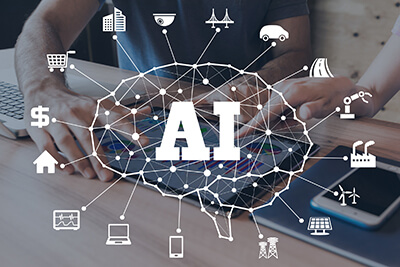We’re already using artificial intelligence marketing today. Artificial intelligence in marketing solutions is no longer something we’ll see sometime in the future. Siri, Cortana, and Alexa are the most obvious. These AI solutions add items to your grocery list, find telephone numbers, add appointments and tasks to your calendar, and help you find the best banana pancake recipe. But what is the role of artificial intelligence in marketing? A lot of AI technology is hidden. For example, you may not know that online customer support chats are actually often run by AI bots. Video games, credit card fraud detection services, and even movie recommendation services all use AI.
Artificial intelligence has the power to make our lives easier, but there’s much more to it than that. Artificial intelligence in marketing solutions has numerous applications. And each of these applications makes your marketing more effective, essentially making your advertising budget work harder for you. You can use artificial intelligence to give your marketing campaigns laser precision, so your ads are displayed directly to your target market. They analyze human behavior and translate it into measurable analytics that you can use to structure your marketing materials to nurture consumers through the sales funnel.
Should you be using AI in your marketing efforts?
Improved Conversion Rate Optimization
Today, websites are competing for user attention more than ever before. There are over 1.8 billion websites that are live right now. With so many to choose from, users are getting choosier about what they want to see. Consumers expect to have meaningful experiences when they visit websites. They want to see content that is relevant to them and their needs or desires. Websites that don’t speak to a user on a personal level won’t keep that user around for long.
AI algorithms can help you personalize your website for users that visit by analyzing multiple points of data about each user. For example, algorithms can analyze their location, how they interact with the website, their social demographics. They can even tell what device they’re using. Then, the algorithms can display the most relevant content and push notifications that are specific to types of users. This makes your website instantly more effective by customizing the user experience for each person that visits, thereby improving conversion rate.
Analytics play an integral role on how you structure your website, landing pages, offers, and other information assets. Artificial intelligence in marketing solutions can help with that too. AI tools like Slackbot analyzes your analytics and generates simplified reports. A tool like Hunch can help you better understand your website’s analytics in real-time.
Data Farming with Chatbots
Customers are seeking more convenient ways to interact with brands. Enter the chat feature. Users are often thrilled to find that they can chat right now with a customer service representative. They no longer have to call a 1-800 number and spend 10 minutes on hold. There’s just one small detail they might not be aware of. They’re probably chatting with a bot.
From a marketing perspective, chatbots are wonderfully useful tools to farm data from customers. A properly structured chat can elicit information from users about their product preferences, their demographics, and even what their pain points are. Enter this information into an intelligent algorithm and you have a plethora of data that can help you offer better products, better service, and a better website experience for your target market.
While implementing AI chatbots can be a great way to offer consumers on-demand customer service help, consider how you can implement it across the board for every website visitor. A pop-up with a short quiz about where they heard about your website can help you determine which marketing efforts have the most impact. Or, a bot can quickly identify what the user is looking for and can direct them to that section of your website or offer specific promotions. Overall, chatbots can be used to scrape data directly from customers, which can be invaluable to your marketing strategy.

Email Personalization
Email marketing is a tricky game. How do you get the best click-through rates? When users open the email, how do you get them to go to the next step? Research shows that, like websites, emails are a more effective marketing tool when they are personalized to the user. If an email appears to have irrelevant information, users will delete the email and move on.
Artificial intelligence algorithms can be extremely valuable when used for email marketing, but it’s important that you have a tool that is able to learn user feedback. AI can glean data from consumers that can make a significant impact on how you structure your campaigns. For example, a good AI tool can determine a user’s wish list, how much time they spend on which pages, what websites and blogs they visited recently, and even the user’s previous interactions with other email marketing messages.
With this type of data, you can create highly specialized email marketing campaigns with multiple if-then scenarios. These scenarios are designed to cater to each individual’s unique interests because they increase the chance of click-through and taking action at some point in the sales funnel.
Automated PPC Advertising
PPC advertising is quite possibly one of the most expensive forms of digital marketing. Although businesses can choose how much (or how little) to spend on PPC, for it to be effective in many markets, a sizable portion of the overall marketing budget should be dedicated to ad spend. Naturally, businesses who are throwing hundreds of thousands of dollars at pay-per-click ads want to make sure their ad dollars are actually making an impact. Artificial intelligence can help.
At the heart of most PPC campaigns is a human person. Someone is behind a computer making the decisions and pushing forward the campaigns, whether someone in-house is dedicated to managing PPC marketing or a business outsources to an agency. This drives up cost and leaves much room for missed opportunities. AI tools can make simple work of PPC advertising.
AI can discover new ad channels that you aren’t using and can manage, analyze, and optimize PPC campaigns with very little human involvement. Large-scale PPC campaigns can benefit even more from artificial intelligence. These tools can engage in automated media buying, targeting, and bids. They can also gather and report data to you to help you fully optimize the layout, graphics, and content of your landing pages.
Intelligent and Customized Buyer Personas
 Buyer personas have been used in traditional and digital marketing for nearly as long as marketing has existed. However, buyer personas may not as effective as once thought. Traditional personas are mostly guesswork. They are not truly personalized. They contain limited information about a fictional customer, such as what their job is, how much money they make, and sometimes very broad goals. Often, marketers create buyer personas without using any actual data.
Buyer personas have been used in traditional and digital marketing for nearly as long as marketing has existed. However, buyer personas may not as effective as once thought. Traditional personas are mostly guesswork. They are not truly personalized. They contain limited information about a fictional customer, such as what their job is, how much money they make, and sometimes very broad goals. Often, marketers create buyer personas without using any actual data.
Another problem with traditional buyer personas is that they don’t take into account online behavior. When your marketing is largely online, it’s imperative that you understand the online behaviors of your potential customers. There’s only so much you can do to customize emails, landing pages, and your website if all you know about your buyer is that they are a CEO and make $100,000 a year.
This is one of the areas of digital marketing where artificial intelligence in marketing solutions shines the most. Artificial intelligence can gather massive amounts of data about users and their online behavior by analyzing a variety of different sources, including social media profiles. Suddenly, you no longer have a CEO who makes $100,000. You have a 28-year-old female who supports clean energy, has 4 cats, binge watches The Office, and spends way too much money at Sephora.
This level of detail and personalization allows you to completely renovate your marketing campaigns to reach real people and deliver them with meaningful online experiences.
Improved Search Features
eCommerce businesses can also reap rewards from implementing artificial intelligence algorithms. Today’s users know what they’re looking for. Less users are browsing and more users are actively searching for the product they want. An eCommerce website’s search function is quite possibly one of the most valuable parts of the website. It should deliver a user to content and products that are relative to their search.
AI has improved the way eCommerce websites deliver results for searches. Instead of simply attempting to match keywords to products, algorithms “understand” what the user is searching for using related information. For example, a user searching for sneakers is also likely to be looking for tennis shoes. Thus, the search would return results for both. Some AI tools allow searches on eCommerce websites to draw data from larger search engines. This eliminates the need for businesses to have to engage in complex coding.
Additionally, artificial intelligence has made it easier for people who misspell or make typing errors to still find the product they are looking for. Using the above example, say someone types “tnnis shos” into the search engine. AI understands that the user really meant to type “tennis shoes” and then displays the appropriate products. In the past, a search engine may have turned up no results because no product titles or descriptions matched that exact spelling, which lead to user frustration and decreased sales.
Better Insights and Forecasting
Gleaning marketing insights from raw data has always been a tough job. It’s intense manual work that involves a lot of math and tedious analysis about what the data really means. It is difficult to understand how to use data to forecast your marketing success. As with many other aspects of digital marketing, artificial intelligence algorithms make gathering insights simple and straightforward.
By analyzing customer behavior and comparing it to more accurate buyer personas, AI can help businesses build effective customer segments. AI can give you insights into your customer’s on-site interactions and their purchase behaviors. This can help you display the most relevant content to users. AI algorithms can tell you which customer segments you should include or exclude from specific marketing campaigns. It can also match customers with products they’re looking for.
AI programs can even go so far as to avoid promoting products to customers with questionable purchase behavior. If, for example, a particular customer has shown to frequently return items in the past, the algorithm will likely not display advertisements for certain products to them, such as limited time offers. Overall, AI does a superior job of taking large buckets of data and analyzing them into actionable reports for companies.
Should You Consider Artificial Intelligence In Marketing Solutions for Your Business?
By now, you likely have a very different idea of what AI can do for online marketing than you did when you first started reading. However, not all types of AI are right for all types of businesses. Integrating AI into the various segments of digital marketing can take time. Are you interested in seeing how artificial intelligence in marketing solutions can take your marketing efforts to the next level? Let’s start.
Identify opportunities for artificial intelligence in marketing solutions and then prioritize them.
Do you have email marketing campaigns or PPC? Do you need updated buyer personas? List out everything that could benefit from using AI tools. Then, look specifically at the ones that have the highest ROI. Don’t worry about segments that are sorely in need of attention if they don’t stand to bring much money into your business. Instead, focus on improving the areas of your digital marketing campaigns that will make the most impact.
Aim for natural engagement.
AI can get pretty personal. Over-personalized campaigns can make users feel like they are being spied on, which can have the opposite effect. Strive to create natural encounters that are on-point but not aggressive.
At MicroD, we offer state-of-the-art digital marketing solutions for websites and eCommerce platforms. We can help you create dynamic, forward-thinking campaigns that are personalized to your target market to increase lead generation and sales. Contact us today at (800) 964-3876 to learn more about how our digital marketing solution can take your marketing efforts to the next level.





